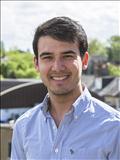Derrick Roberts is lead author on a paper on research which has succeeded in transforming the structure of a supramolecular complex in three different ways.
Switching between the structures allows us to make use of all their properties on demand.
Derrick Roberts
Researchers have, for the first time, succeeded in transforming the structure of a supramolecular complex in three different ways, according to a new paper.
Gates Cambridge Scholar Derrick Roberts [2012] is co-lead author with Dr Ben Pilgrim on the paper published in the Journal of the American Chemical Society which relates to his research while at the University of Cambridge.
His research focused on metal-containing supramolecular complexes. Organic ligands self-assemble around metal atoms to form molecular cages of various sizes and shapes. Researchers have been able to change a complex’s shape by changing either the metal or the ligand, but until now they have not been able to create a particular shape by design.
The newly published paper describes the creation of a supramolecular complex that converts between three different shapes – a tetrahedron, helix and prism.
Derrick, who is now a post-doctoral fellow at the Karlinska Institute, says: “Switching between the structures allows us to make use of all their properties on demand.” For instance, prism-shaped complexes can make holes in cell membranes and mimic artificial ion channels; helical complexes can interact with DNA; and tetrahedral cages can trap reactive chemicals. He describes this as making the complex "like a Swiss Army knife”.
The research, led by Professor Jonathan Nitschke at the Department of Chemistry, first combined iron atoms and nitrogen-containing ligands to form a tetrahedral complex. Cyclooctyne was added, which attached to a reactive portion in the centre of each ligand, slightly bending it and enabling the complex to change its structure – mainly to a helical structure.
To change it back to a tetrahedral structure, the researchers boosted the bonds between the ligands and the metal atoms at the corners of the tetrahedron.
Finally, the researchers used anion templating to convert the complex into a prism structure, adding a salt containing PF6 anions.

Derrick Roberts
- Alumni
- Australia
- 2012 PhD Chemistry
- Trinity College
I was born in Singapore in 1988 and was raised in Sydney, Australia. From 2007–2010, I undertook a BSc. (Adv) Hons. at the University of Sydney, Australia, for which I was awarded first class honours and the University Medal in Physical/Organic Chemistry. In 2012 I obtained an MSc. in polymer chemistry from Sydney University under the supervision of Professors Sebastien Perrier and Maxwell J. Crossley. From 2013 to 2016, I was awarded a Gates Cambridge Scholarship to undertake PhD studies under Professor Jonathan Nitschke at the University of Cambridge. My PhD thesis explored the covalent post-assembly modification of metallosupramolecular architectures.
From February 2017-2019, I undertook a Marie Curie Postdoctoral Fellowship in the Stevens Group at the Karolinska Institute, Sweden. My work focused on the preparation of stimuli-responsive synthetic biomaterials for accelerating the healing of chronic skin wounds.
From June 2019, I will join the faculty at the University of Sydney's school of chemistry as a Discovery Early Career Research Award Fellow, funded by the Australian Research Council. My work will focus on stimuli-responsive self-assembled polymers.
Previous Education
University of Sydney MSc., Polymer Chemistry 2012
University of Sydney BSc. Adv (Hons 1M), Physical–Organic Chemistry 2010












